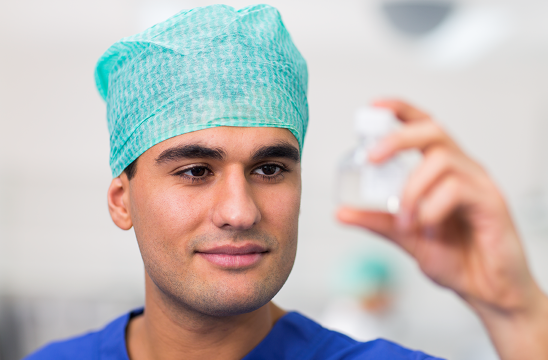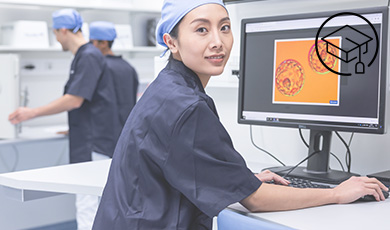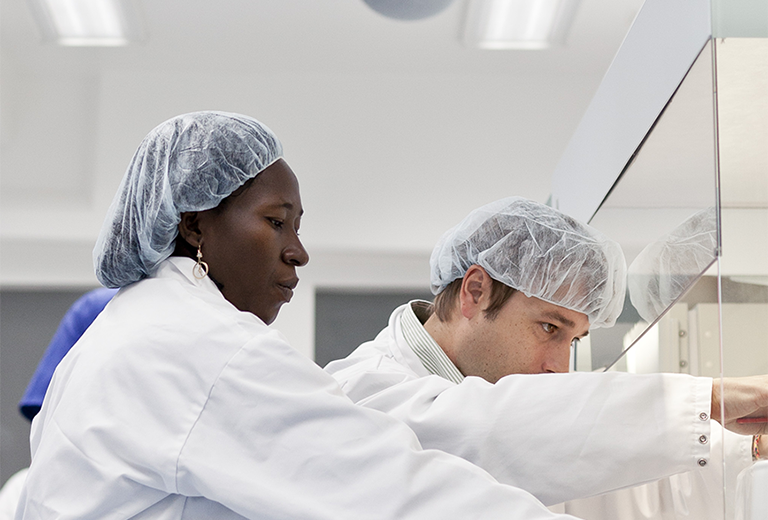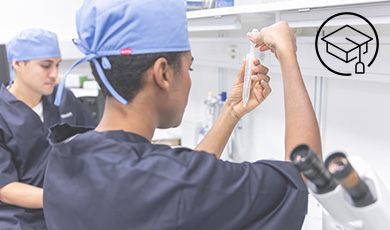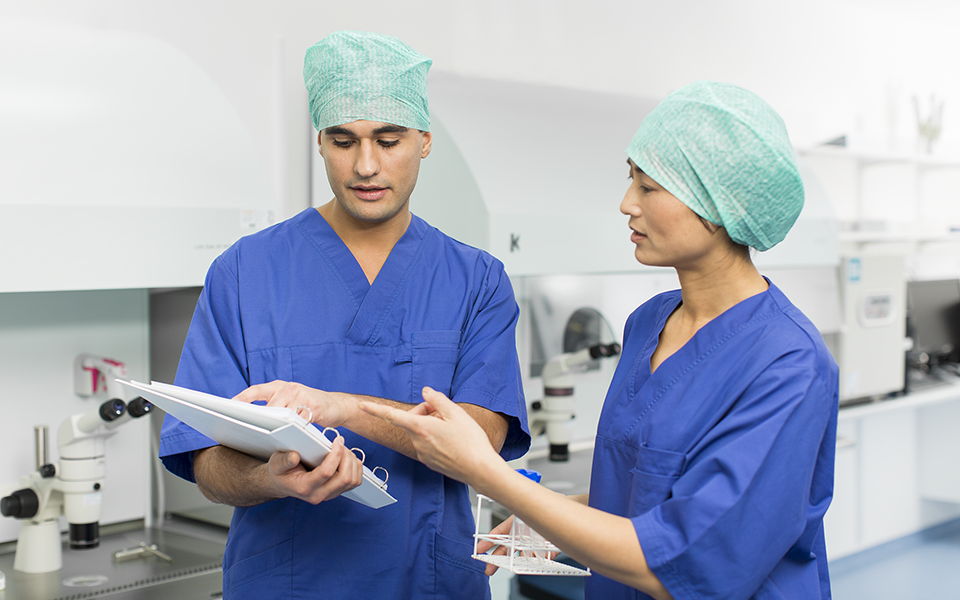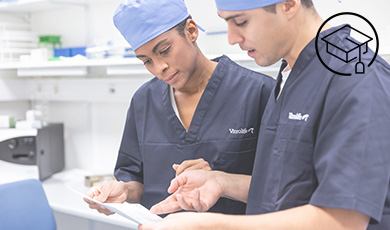Lab & Quality control
Increase my knowledge
-
![]()
Webinar: 'What should you consider when changing your IVF culture media system?'
In this webinar Erik Strait, MEA Lab Manager at Vitrolife Group, educate us on the extensive oil testing process and how assessments and acceptance criteria used in the Mouse Embryo Assay (MEA) are critical aspects of a sensitive assay. Dr George Koustas, Director of Embryology at Columbia University Fertility Center, present his experience with implementing the Vitrolife culture system to the laboratory and how to make it a smooth transition.
Watch webinar -
![]()
Webinar: 'Safety of your gametes and embryos with eWitness!'
In this webinar Dr. Kellt Tilleman share and demonstrate the implementation and use of an electronic witnessing system in their IVF laboratory to ensure the safe tracking.
Watch webinar -
![]()
Webinar: 'Safety of your gametes and embryos with eWitness'
Dr. Kelly Tilleman, IVF Laboratory Director, UZ Gent, Belgium, demonstrates the implementation and use of an electronic witnessing system in their IVF laboratory to ensure the safe tracking and identification of their patients’ gametes and embryos at all times during the IVF process.
Watch webinar -
![]()
Importance of CE marked medical devices in good laboratory practice
The CE marking on a medical device indicates that the product complies with European Union (EU) regulations. This certification highlights the fact that the product meets general safety and performance requirements as set out in Regulation (EU) 2017/745, AKA Medical Device Regulations (MDR). As well as being a legal requirement to have the CE marking in the European Economic Area (EEA), or equivalent in certain markets, it also provides reassurance that the medical device has undergone rigorous testing and assessment to ensure its safety and performance. This helps protect patients and users from potential risks associated with using non-compliant or unsafe devices.
Read blog post -
![]()
Webinar: 'Mouse Embryo Assay (MEA): Why do assessments and acceptance criteria matter?'
In this webinar Erik Strait, MEA Lab Manager at Vitrolife Group, educate us on why the assessments and acceptance criteria used in the Mouse Embryo Assay (MEA) are critical aspects of a sensitive assay. The Vitrolife MEA is the most valuable tool we have to ensure safe and consistent products. It makes it possible for clinics to create a safe and optimal environment for embryo development and ultimately ensure successful results for patients.
Watch webinar -
![]()
Webinar: 'Quality all the way - It's not what you do, it's the way that you do it!'
In this webinar, Erik Strait, MEA Lab Manager at Vitrolife Group, educate us on the mouse embryo assay (MEA), the most valuable tool Vitrolife has to ensure safe and consistent products. It makes it possible for clinics to create a safe and optimal environment for embryo development and ultimately ensure successful results for patients.
Watch webinar -
![]()
Webinar: 'New temperature probe and measurements'
In this presentation, Christer Silversand, Scientific Consultant, talks about VitroTemp.
Watch webinar -
![]()
Is it safe to aliquot IVF media?
A question we often get from clinics is for how long time an opened bottle can be used. And if it is possible to aliquot and use the medium until expiry date. In this blog post Dr. Ann-Helene Jakobsson makes an attempt to answer these and other related questions on safe usage of media.
Read blog post -
![]()
Webinar: 'Returning to safe IVF lab operations in the COVID era'
In this webinar, Dr. Jason E. Swain and Dr. Charles Bormann will discuss disaster preparedness, and the new realities and considerations COVID-19 will impose on day-to-day operations within IVF Clinics and Infertility Practices. The webinar is moderated by Dr. Mark Larman PhD, Chief Scientific Officer, Vitrolife.
Watch webinar -
![]()
How clean is the air in your IVF lab?
In one of our most read blog posts, embryologist Giles Palmer gives advice on what to think about in order to get good air quality in your lab.
Read blog post -
![]()
Webinar: 'The importance of quality control in the human ivf laboratory'
In this webinar, Dr. Markus Montag will discuss various aspects of quality control. The importance of osmolality, pH, temperature control, air quality, workflow, embryotoxicity and various other laboratory aspects will be explained.
Watch webinar -
![]()
Temperature measurements and temperature control in the IVF lab are crucial for your results
It is common practice to maintain a temperature of 37°C during all working and culture conditions in the IVF laboratory. This will allow for an optimal environment for the handling and culture of gametes and embryos. In this blog post Jaco Terblanche, from Vitrolife Academy, will explain why temperature control in the IVF lab is crucial, what equipment to be measured, when to measure and what to do with the results.
Read blog post -
![]()
Webinar: 'How to create optimal culture conditions by paying attention to quality control'
In this webinar, Dr. Christer Silversand will help you understand how you can create optimal culture conditions by understanding the importance of extensive quality testing and using an unbroken chain of quality products.
Watch webinar -
![]()
Why you should only use IVF certified plastics
The success of an IVF treatment depends on numerous factors. The patients and the causes of their infertility, the hormone stimulation regimen, culture media, quality and maintenance of equipment and skills of staff are all factors that will influence the outcome. One important factor that can have a detrimental impact on the IVF treatment outcome, but is sometimes overlooked, is the quality of the plastic equipment. Learn more in this blog post written by Dr. Ann-Helene Jakobsson.
Read blog post -
![]()
Quality and workflow efficiency - two sides of the same coin
Looking at available data on results in IVF, outcome differs widely between clinics and countries. In this blog post Dr. Markus Montag speculates if this could be related to quality and workflow in the constantly developing field of IVF. He also provides valuable tips on how to create a more efficient workflow in your lab and thus gain higher quality.
Read blog post -
![]()
The use of plastic equipment in IVF
There are at least 30 plastic items involved in every IVF procedure. If each of the 30 items used during an IVF-treatment reduces the embryos viability by 2%, the final viability at re-implantation is reduced by 44%. Download this white paper to learn about what to think about when using plastics in your IVF lab.
Download white paper -
![]()
Our mouse embryo assay (MEA) secures embryo viability
Our mouse embryo assay (MEA) is the most valuable tool we have to ensure safe and consistent products. This makes it possible for our customers to create an optimal environment for embryo development and ultimately help patients become parents. Watch this video from our MEA lab in Denver to deepen your knowledge about the critical aspects of MEA and how our stringent testing benefits your daily work in the lab.
-
![]()
Establishing a new fertility centre - investing in laboratory technology
Watch embryologist Katie Vaughan from Cambridge IVF in UK talking about their purpose-built assisted reproduction unit. Learn about practical aspects, their investments in laboratory technology and the importance of choosing suppliers that shared their vision.







